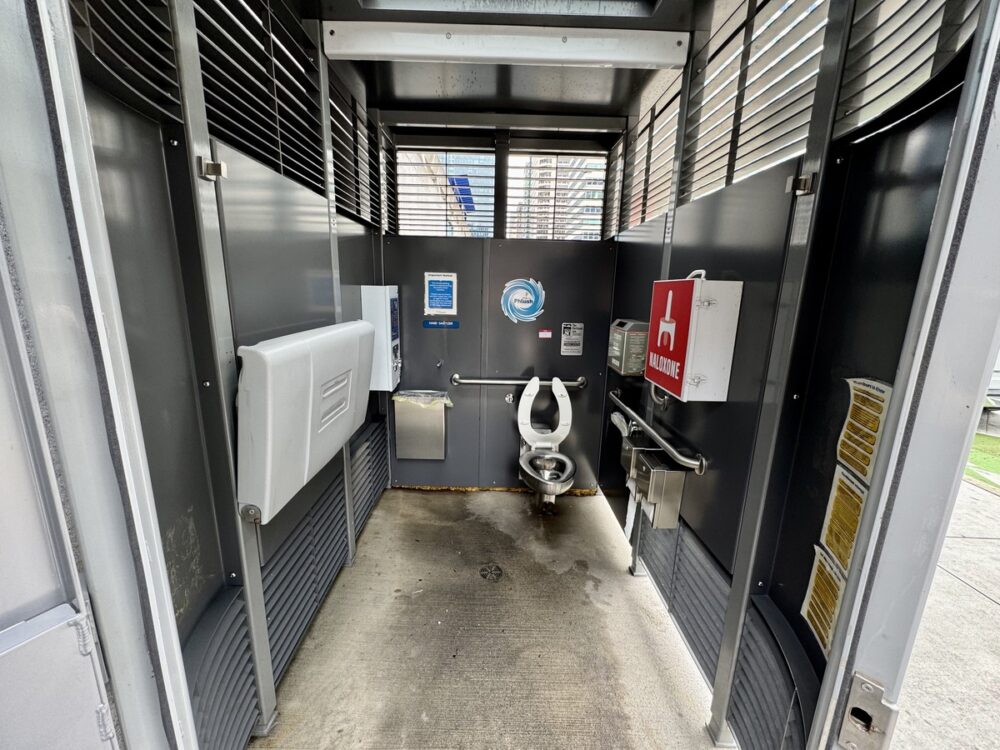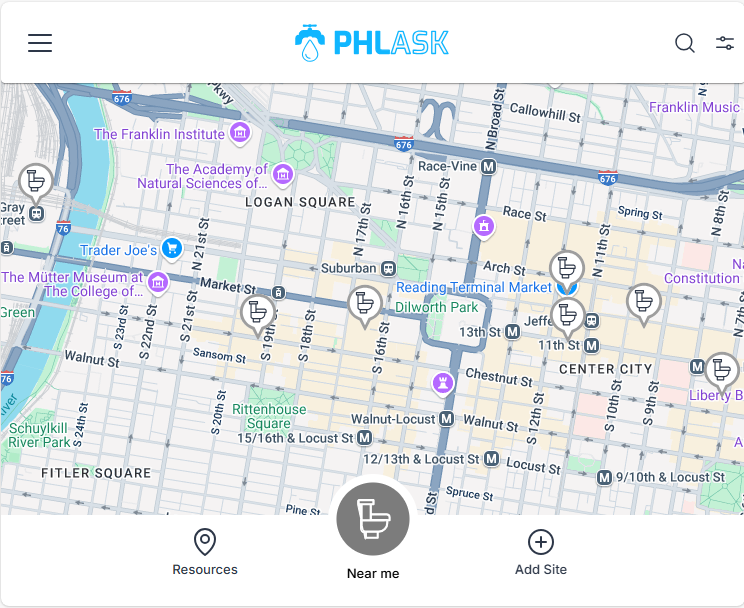
Got to go? PHLASK helps you find public restrooms & water fountains in Philly
An app created to help users find drinking water in the city has expanded to include public restrooms, food, and foraging.
As summer heat requires lots of hydration and refreshments, tourists and families frequently need to make a quick pit stop.
Enter: PHLASK, a web app featuring a map with four searchable categories: drinking water, foraging of fruit and nut trees, food, and bathrooms.
Originally created as a social practice art project, PHLASK intended to examine access to water throughout the city. The first iteration of the map focused on just free drinking water locations. Not long after the app’s launch, however, the Covid-19 pandemic hit, shuttering drinking fountains. Billy Hanafee, a project initiator with PHLASK since 2018, said that this moment changed the course of the project.
“We had this map that we realized was still a useful resource in spite of Covid requiring that all water fountains were closed down, so we wanted to start applying it for other resources,” said Hanafee. At the time, a surging demand for free food led the PHLASK team to start exploring how to use the app to map food locations. Since then, said Hanafee, the team has worked to incrementally introduce other resources – like public restrooms.

City restroom supply does not meet the demand
Public restrooms are a rarity in the City of Brotherly Love. Whether searching for them in the public parks or bustling areas, Philadelphians and visitors may struggle to find appropriate facilities for their needs.
And those summer visitors are a big part of Philadelphia’s economy. Last year, the Philadelphia Convention and Visitors Bureau announced that over 1.6 million hotel room nights were sold in Center City – an 8.2 percent increase compared to summer 2023.
James Kyle, a representative from the city’s Department of Public Health, told Green Philly that Philadelphia does not have enough public restrooms to meet the demand, but stressed the importance of public facilities. “[Public restrooms are] an essential service to make public spaces accessible to all,” said Kyle. “When people know that public restrooms are available and clean, they are more likely to participate in the life of the City.”
The Philly Phlush pilot public toilet project – in which the Department of Public Health planned to install six stand-alone bathrooms in the city – is at least three years in the making. Currently, there are two Phlush bathrooms installed: one on the corner of 15th and Arch in Center City; and another off West Cumberland Street at Fotterall Square in North Philly. A third one is set to open in Clark Park in West Philadelphia this year, but has faced delays in the past.
“Bringing a restroom to Clark Park is important to us. Over the past few summers, the Friends of Clark Park has funded temporary portable toilets for park visitors. We remain hopeful that a permanent restroom will soon be installed in Clark Park,” said Ben Sirolly, the President of Friends of Clark Park, in a statement to Green Philly. The Friends group was a partner in the planning process for Philly Phlush at this location.
According to Kyle, a fourth and fifth Phlush are in planning stages for 2026 and 2027, but department representatives “anticipate a sixth Philly Phlush will not be possible with the pilot’s current funding.”
Increasing accessibility & sustainability
For Hanafee and his colleague, Ariel Silbert, the goal of PHLASK is two-fold; it is both a tool for accessing essential services as well as a means to advocate for using shared, public goods, which tend to have a lower carbon footprint. This is why, Hanafee said, he was drawn to the original project on drinking water.
“If you look at different life cycle assessments, it takes a marginal amount of energy to get water from the tap system versus getting it from a bottle of water,” explained Hanafee. That means that the cost of drinking water from the tap is also lower than when consuming other water products. And with low costs, Hanafee asks, “Should water be free in the first place? The project says yes, it should be.”
Silbert added that making a small shift toward sustainability by “helping out on a project like this that moves people towards using resources that we already have increases equitability and access.” She said she looks forward to boosting the app’s impact by considering how to reach people with limited income and differing physical abilities and marginalized communities. The team is considering adding locations for free Wi-Fi, electrical outlets, menstrual products, and bookstands, among others.
Note: The idea for this article was generated through conversations with community members at our first-ever pop-up newsroom during our annual EcoFair. To participate in the next one, please join us on August 6th for Green Drinks at The Oval, where our Civics Reporter, Angie Bacha, will be waiting for your suggestions!
Cover Photo: Philly Phlush restroom in Center City. Credit: Lauren Belcher






